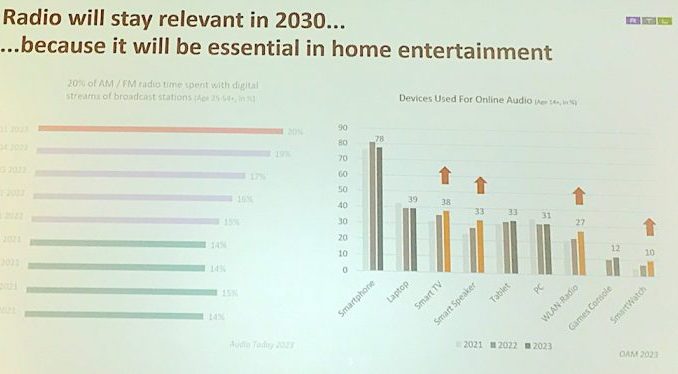
“Radio will stay relevant in 2030…” said Christian Schalt, Chief Digital Officer RTL Radio Deutschland.
“We need to understand the present challenges for radio in order to understand the future challenges.”
These present challenges include:
- more competition and more digital stations means a more crowded market
- new audio players
- consumers’ time is competitive
Time spent with radio is decreasing. Younger listeners have a more rapid decrease. Although cume is going down it’s stable as it’s only down by 1% between 2021 and 2022.
The good news is that radio will still be relevant in 2030 due to the following:
- it’s position in cars
- music discovery tool, radio retains top 3 position
Schalt said the survey conducted by the Katz Radio Group (U.S) 2022 showed that radio advertising is highly effective as it’s also the least annoying medium in the advertising space. It’s also seen as the most trustworthy medium in Europe. The research shows that Brands using radio get back their money nearly eight times over on average.
Another reason for radio’s continued survival is that radio personalities are influencers, just like influencers social media as 84% of audiences said they’d follow their favourite personality to a new station. When their favourite radio or podcast personality recommends a product 77% would try the recommendation.
Radio will stay resilient as it will operate on more data. Data shows in real time how to monetise inventory, realtime KPI’s for spot monetisation.
Radioplayer, more personalised app experiences and smart speakers will also play in role in keeping radio relevant.
Schalt said that radio will be essential in home entertainment through the rise of the smart TV for mostly radio listening. Schalt quoted another 2022 study that 37% of online audio users who own a Smart TV use it for Webradio.
AI can help reduce costs and add functional benefits by helping create content, market and sell plus broadcast, said Schalt.
AI can add value to the chain by using:
- Synthetic and artificial voices for reading news but not replacing DJ’s
- Automated spot creation to make spots more affordable.
- Artificial voices for speaking sponsor message e.g.. Tom Hanks contextual audio add.
Summing up Schalt says that radio will stay relevant in 2030 because:
- It’ll be driven by data and insights
- Strong in the car
- Smart and connected
- Highly effective for advertising
- Leveraged by AI
This story first appeared on RadioInfo.asia
